‘An Istanbul Mystery’ says the subtitle, the fourth in a series, but the only one readily available to me.
A nice set-up with the young girl exploring the island while the dog takes charge. There is a mystery in a cave and an array of characters, Cousin Evangeline and Uncle Orville added to the mayhem. The séance was a laugh. The running joke about the talking dog was deft. The plaintiff ney lessons were part of the local color.

It is amusing, and the children are fun, and the final denouement surprised me.
On the other hand the French diplomat was not even cardboard, and after he was inflicted upon the reader, he was then dropped. Likewise the two French police officers, who were portrayed more kindly, were introduced and then dropped.
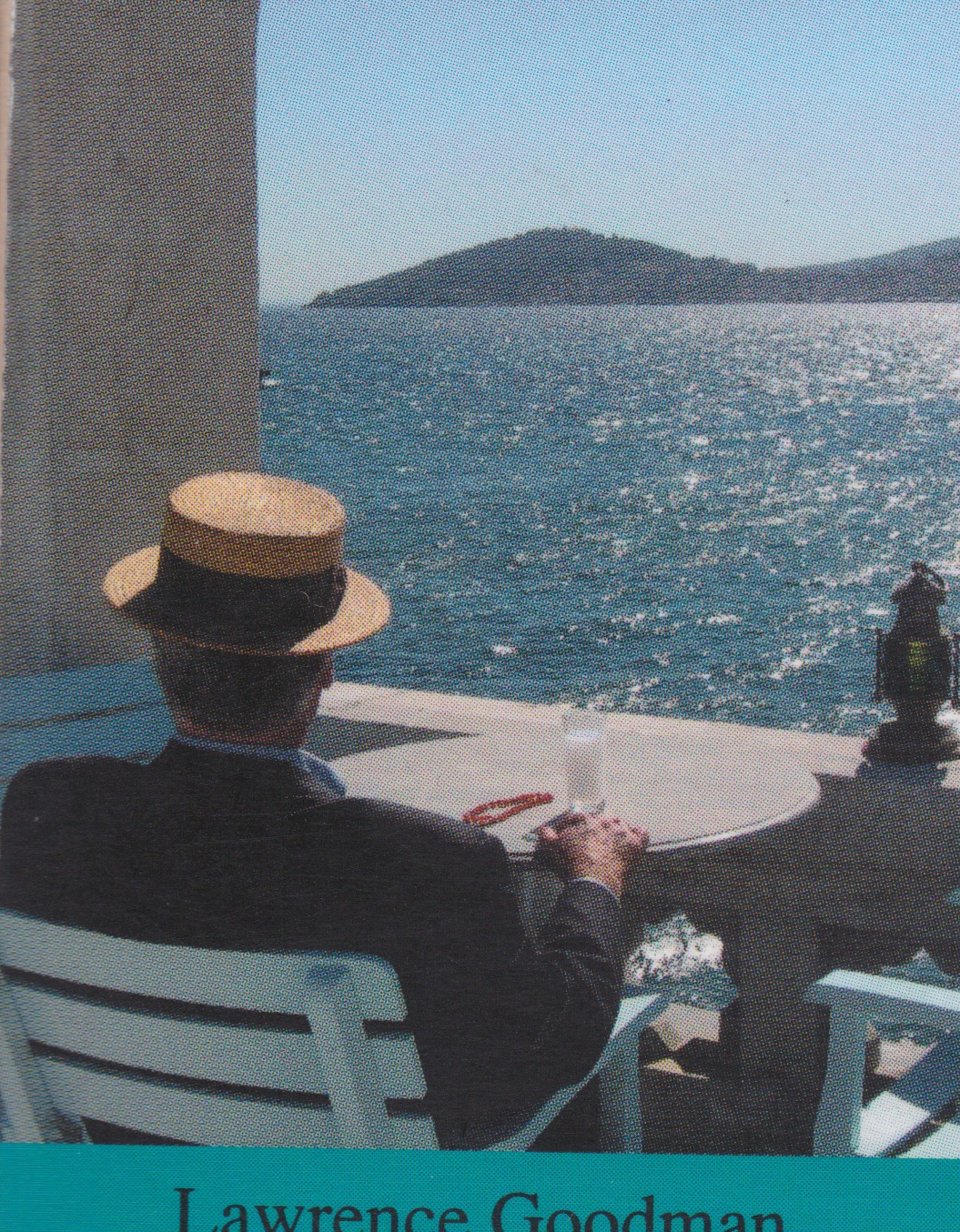 Laurence Goodman, from the back cover
Laurence Goodman, from the back cover
Having said that, I am not motivated to seek out the other titles in the series.
‘Departures’ (2008)
Thanks to the miracle of SBS Television we went to Japan last night and got back in time to go to bed, watching ‘Departures,’ a life-affirming film with cello music about death. Slow, meticulous, and accessible with some travelogue, the story of young Daigo Kobayashi’s transition from mediocre cello player to encoffiner is related, and the effects of the move on those around him, starting with his loyal, but taxed wife.
‘Encoffiner’ is one word Noah Webster did not get. In this case it means laying out of dead person to be placed into a coffin. This is a task performed before the undertaker disposes of the body. ‘Task,’ no, not the right word. Ritual is the word, a performance before the deceased’s family. It is done with the decorum, grace, and precision of the best of Japanese culture, but achieving that takes time and practice, and sometimes the difficulty is compounded by the emotions which the death has unleashed in the family. All of this, and more, is carefully documented as Daigo, reluctantly, enters this world.

He is broke, in debt far beyond Mika’s, his wife, wildest guess: celli are expensive. The ready money NK Agents offers is too tempting to refuse.
His initial revulsion at both the physical and social aspect of the work is gradually overcome when he realises slowly that the ceremony is of great solace to many families. In time he finds solace of his own in the task. Though it does take a longtime to close the loops and there is more repetition than I liked. Robert Ebert reviewed it in 2009 and gave it four stars out of four and wrote his usual perceptive comments with some comparisons to other films.
 Yojiro Takita, the director with the Oscar for best Foreign Picture.
Yojiro Takita, the director with the Oscar for best Foreign Picture.
We could have watched Computer Generated Images slug it out on 7MATE but we preferred something about life and people, not comic strip nonsense made by prepubescent boys for prepubescent boys, or is that the other way around. Or we could have been hectored by an ABC journalist firmly brandishing one end, usually the wrong end, of a stick. So many choices.
I record a selection of SBS free-to-air movies based on David Stratton’s comments in ‘TV Week.’ I use his comments and not his ratings, which I find too high, though he has recently changed the method and I am still trying to gauge his new approach of categorising rather than numbering.
‘Mittsommernachtstango’ (2013)
This is a feature film from Finland, the land of low-key but often very interesting and accessible movies.
Genre? Mockumentary, I guess. It is told deadpan. A Finn writes to a tango club in Buenos Aires, claiming that the tango originated in Finland, and supplies a long and detailed history of its evolution in the far north of the far north. While the Argentines laugh it off, it is, well, curious, and what, after all, is Finland like that these people would make such a stupid claim.

Three of them club together — a guitar player, a singer, and a dancer — to head north to the land of midnight sun, endless forests that all look alike, wrong turns, language barriers, a dead battery, and reindeer on the road.
They find something they never found in Buenos Aires, peace-and-quiet, and also people who have plenty of time for them to get past that language barrier and they learn some things about themselves, Finland, and even the tango, as they finally admit. The explanation of why Finnish men like the tango is perfect.


Completely unpretentious, no plot twists, plenty of travelogue, first in Buenos Aires and then Lapland. That deity of film criticism Roger Ebert would certainly give it all thumbs up, and so do I.
Fiction? Well not quite. See Wikipedia for an entry on the Finnish tango, and be enlightened.
I read a charming review of this Finnish film about a year ago, and determined to have a look at it. I tried to get it on iTunes but failed. It could not be sold into the Australian market. I even tried to fool iTunes by logging in while in the States to no avail. Though it was available for purchase, I could not purchase it. Frustrating. Yet another chance to develop my patience. (Yes, I know about VPN, but my needs are few.)
I thought that by June 2015 it would surely be available. I was assuming it would be screened at the Sydney Film Festival, since it seemed perfect for that, and then have a commercial release and we could see it on the wide screen. I checked with a Film Festivalian of my acquaintance, who said no, it was not on the program. Rats!
I tried again to locate it for purchase and lo and behold I found a vendor and ordered it toute suite! It promptly arrived and we gave it a spin.
‘The Tin Flute’ (1945) by Gabrielle Roy (1909-1983).
A novel of life among destitute Canadiens in Montréal of the Great Depression. Yet a book that brims with life, and ends with optimism.
The description of the snow driven before the wind as a dancer pursued by a cracking whip was marvellous, graphic, exciting, and accurate. Then there was the house party and the young and inexperienced Florentine measures herself against her rivals, parents, and beau. Her combination of defensive quips and throbbing hormones is certainly right. Emanuel’s unwilling love for Florentine and her gradual response, each with inner doubts, provides the unity of the story.
Gabrielle Roy is the novelist of a Montréal now gone, the Montréal of Maurice Duplessis, and even the egregious Jean Drapeau, long before Le révolution tranquil. The working class French of 1940 stay of their side of Rue St Laurence in a quietude that is born with a stubborn resignation. The Church offers spiritual comfort in a world where there are few material comforts after a decade of the Great Depression.

That endurance is personified in Rose-Anna Lacasse, the mother of a starving clan of ten, soon to be eleven, children with her earnest but eight-year unemployed husband Azarius. All of them go to bed hungry and get up hungry. The children dress in rags and share shoes. Yet they all persevere.
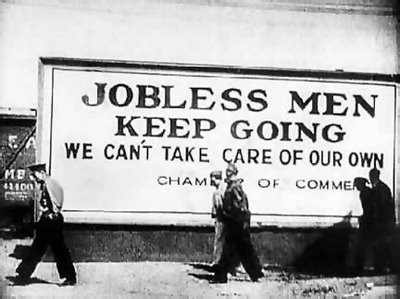 A sign in Montréal in 1939.
A sign in Montréal in 1939.
Roy enters into the lives of her characters, or maybe it is the other way around, they have entered into her life and she chronicles their determination, dignity, forbearance, and humiliations in a world they did not make, but in which theirs is to make the best of if that they can. The inner monologues of her cast of characters are compelling. Confused, determined, troubled, hesitant, defeated, defiant they may be inside, but outside each tries to maintain a façade. Rose-Anna is calm; Azarius is cheerful; Emanuel is self-contained; Florentine is scornful….
To a politically-minded person they are victims of an oppressive social order that could be changed. To Roy they are God’s children, each one precious, individual, and whole just as they are.
The novel, written by a Manitoba school teacher, provides a companion piece to The Canadian novel, ‘The Two Solitudes’ written at nearly the same time by a Nova Scotia school teacher. But the books differ. McLennan’s ‘Two Solitudes’ implies a political agenda and it looks to a changed and perhaps better future. Roy accepts eternal reality as the mystery of life in which we must trust in God and ourselves. That might sound passé, even retrograde, to some but in her hands it is a message of salvation.
By the way, in McLennan’s novel conscription into the Canadian army is feared by Canadiens, but in Roy’s novel three of the central Québecois characters voluntarily enlist, and a fourth throws himself into a war industry. The army represents a job, an income, after nearly a decade without either. (Yes, I know some of them ended their lives at Dièppe in 1942.)
Moreover, when I compare this book to so many contemporary prize-wining novels that I try, and fail, to read, I realise she has the one essential of a novelist, that so many published novelists lack, a story to tell about people. To which she adds a sympathy, an empathy for others that transcends the facile judgements that reviewers love.
I have read her ‘Alexandre Chenevert’ (1951) and ‘Where Nests the Waterhen’ (1955) and found much pleasure and occasion to reflect in each. There is a very informative biography of her on the Canadian Dictionary of Biography online web site. She wrote constantly and kept every word she wrote including letters sent (and received). The Amazon Canada web site has shown her for more than a year as ‘Roy Gabrielle,’ despite many complaints, mine among them. The Mechanical Turk has fallen asleep, it seems. I see in this mixup the fate of those with two first names, but others find a darker purpose to capture her work for the masculine!
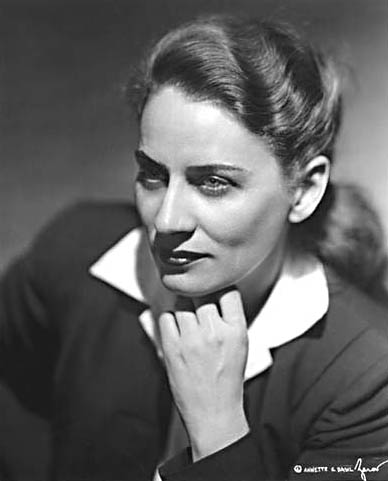 Gabrielle Roy
Gabrielle Roy
The original title was ‘Bonheur d’occasion’ which is an idiom meaning, at its most basic, ‘Best wishes.’ The title ‘The Tin Flute’ refers to one incident in the novel. It was filmed in 1983, turning this compassionate study of grace under pressure into melodramatic drivel suitable for a mid-day movie.
‘Oscar Underwood: A Political Biography’ (1980) by Evans Johnson
Oscar Underwood (1862-1929) was contemporary and sometime rival of Woodrow Wilson, William Jennings Bryan, and Eugene Debs.
Born in Alabama during the Civil War, Underwood’s childhood was during Reconstruction when the South was occupied and pillaged to pay reparations for the war. In particular the Republican Party descended on the South to insure it would never cause trouble again by manipulating laws and voters. This baleful episode was ending when Underwood came of age, but its legacy continued (e.g., in those Confederate flags on state capitol domes).
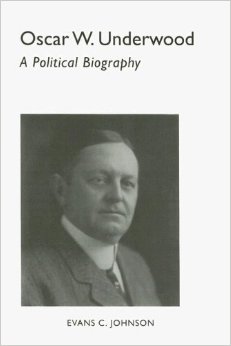
Patrician by birth, he was a man of his time and place. He thought women should be pregnant or in the kitchen or both. Negroes were beasts of burden best kept under strict control. Southern Europeans were failed human beings. Organised labor was anathema. In his political career, to be described shortly, he was parochial, only what was good for Alabama was important.
Why read about such an obscure figure? I am glad you asked that question, Mr. Spock! (1) He was a candidate for the Democratic presidential nomination in the famous hung convention of 1924 and (2) he was one of the ‘Profiles in Courage’ (1957) television series for his confrontation with the Ku Klux Klan. The little I knew of these events made them seem odd for an Alabaman of his time and place. (3) Having just read about the egregious Alabaman George Wallace, I wondered about his fellow Alabaman. Now is the time to find out more.
Underwood ran for Congress and represented the Ninth District (Birmingham) just as the Republican ascendancy was ending. He joined with many others to purge electoral rolls of blacks and to keep them off thereafter. He developed a lock on the Democratic Party nomination as the Republican Party died in the South.
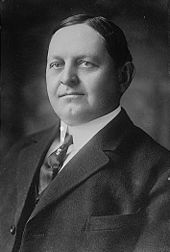
He toadied up to the Speaker of House of Representative Champ Clark who had presidential ambitions. Clark rewarded him with the chair of the House Ways and Means Committee. At the time this was a minor post, but Underwood made it into an important one with some creative thinking, hard work, and unfailingly politeness. Underwood became indispensable to the business of the House. He was ever present, always ready to do what needed to be done, even if strictly speaking someone else was supposed to do it, no job too big, no job too small. He also proved to be adroit in stroking the many egos that needed to be stroked.
His main interest in Washington was tariffs affecting his constituency, and he laboured over the tariff schedules as though they were holy writ. He had always loved facts and figures and this subject played to that strength of this born accountant. The tariff was a major national issue and he became the master of the detail of tariff schedules, the impact of item #116 on Schedule B in Part 1.21 paragraph 2.0 on his constituency, and he soon schooled others in this detail, too, as it applied to their own constituencies.
The Ways and Means Committee, then as now, manages the business of the House of Representatives, and Underwood used this as an instrument to impose party discipline. In fact, in hindsight it seems that he had more success in securing party discipline than at any other time in the history of the House. Only when there was a two-thirds majority vote from Democrats in the Party Room, would he bring a matter to the floor of the House for a vote, but then he expected 100% compliance from Democrats on the floor of the House. Dissenters soon found strange delays in office cleaning, faulty telephone lines, etc. Nothing terribly subtle about it but then there was nothing personal in it either.
In time he grew bored. Holding the Birmingham seat was foreordained; he had party discipline to a fine art. He now contracted that virus so common in Washington, Potomac Fever. He became to think of himself as a statesman, and became a little less parochial, and he began to think another Southerner might one day soon be elected president. That Southern might as well be Oscar Underwood as anyone else. He was right, it was time for a Southerner: Woodrow Wilson.
In the 1912 Democratic Convention Underwood was one of the nominees, positioned to be a compromise candidate if the front runners, Clark and Wilson failed. Wilson prevailed, and he sounded Underwood out for the Vice-Presidential nomination, but Underwood declined. I am not at all sure how serious that sounding was, because even the naif Wilson must have realised two sons of the South on the Democratic ticket would be one too many.

Wilson’s victory was a Democrat landslide and the House majority became gigantic. Underwood used all the tactics, techniques, and tricks he had learned to discipline the mob of newbies that entered the House, each determined to right all wrongs, and change everything for the better. By that time he was an old hand at managing such upstarts. They soon discovered just how unimportant a Congressman is when there is a 100-vote majority. The object lessons were quick and decisive. Outspokenly independent Democrats had no office space, no secretarial assistance, the postage franking certificate was lost…. His handshake was firm, his smile warm, his determination to lead was Birmingham steel.
While Underwood personally had no time for the amateur newcomer Wilson, he sailed with the wind in Wilson’s canvas. And besides Wilson was far preferable to Bryan, in part because Underwood must have supposed he could manipulate Wilson, though the author is silent on that possibility. Wilson’s preoccupations with the high road and his absolute belief in the separation of powers meant that he left Underwood to run the House, and run it he did.
The first item of business was the tariff, and in the new Congress no hotel vouchers were issued, no office-space was assigned and no committee posts allocated, until the tariff schedules Underwood had devised over the preceding years had been passed. He really did hold them to ransom. Pass my tariff bill (it was an omnibus bill with 57 parts to make it harder to be amended, split, or qualified with riders) or else a new Congressman may never have had an office to sit in let alone a committee seat to brag about back home. Likewise he managed the floor debate with an iron hand. Debate was permitted but not one word off the topic was tolerated, nor were any extensions of time to debate granted. A speaker who wandered off topic would be handed a note from Underwood asking him to yield.
While the small Republican minority squawked, many of them enjoyed the spectacle of new Democratic Congressmen learning the Washington game the hard way. If Underwood’s touch seems heavy, it was light compared to that applied by the previous Republican rule when debate was often not allowed.
Underwood was both a social conservative and also a fiscal conservative, yet he steered Wilson’s progressive legislation through the House of Representatives. Politics makes strange bedfellows they say.
Like many other Southerners, to Underwood the Federal government was the enemy, and he constantly voted against appropriations for any and everything, unless the money was to be spent in Birmingham. He was one of the majority who voted to cut defence spending, public health spending, education spending, funding for scientific research, staffing for foreign missions, and so on and on. The only Federal dollars he voted to spend were those bound for northern Alabama. When, however, Potomac Fever gripped him he did try to broaden his outlook, though his heart was not in it.
With Wilson in the White House, and the House proving ever harder to control, Underwood decided to move up. He secured the Democratic nomination for an Alabama Senate seat. He fought off a challenger in the Democratic primary and easily won the election. The challenge was based on what was the central issue of national politics for some years — prohibition.
After twenty years in the House of Representatives with many accolades, Underwood entered the Senate as the newest of the new boys, and found an altogether different atmosphere. The Senate was a club whose members indulged each other. There was no urgency. Underwood who had insisted on party unity and discipline in the House became himself a dissident voice in the Senate, often speaking against Democratic measures, though at the end of the day he usually voted for them, a ploy that remains common today. Speak one-way and vote the other in the effort to please both camps. Thereafter he would often then vote against the appropriation of funds for measures he had earlier voted for. Another ploy that is time-honoured.
However Underwood did not enjoy the pleasures of the iconoclast for long and soon began managing bills in the Senate and by the beginning of his second term, he was Democrat leader in the Senate. The foreign crises with Mexico and Germany did not interest him much but he went through the motions that his ambitions required. He supported Wilson in the Great War (making sure plenty of contracts went to Birmingham) and then the Treaty of Versailles but without conspicuous energy or wit.
He had been nominated for the Presidential place in the 1912 Democratic Party convention which Wilson won. Had Wilson stepped aside in 1916, and there were such rumours, he would certainly have tried for it. In 1920, well the time was not right. He was up for re-election to the Senate and Alabama state law prohibited anyone from being a candidate for two offices in the same election. He preferred to secure six more years in Washington by contesting the Senate primary and election with an eye on 1924. He campaigned for the Democratic Cox-Roosevelt (F. D.) ticket nationally though it was a lost cause from the start.
At last we come to the Ku Klux Klan. The Klan was rooted in the South and had been rejuvenated by, of all things, the prohibition movement. It was violently prohibitionist, as it was violently racist, violently anti-Catholic, xenophobic, anti-union, misogynist, anti-intellectual…..
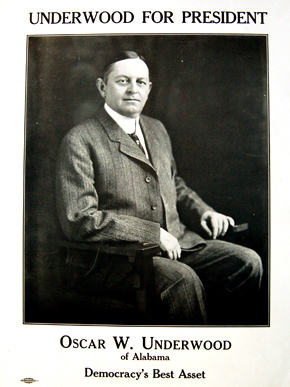
Underwood position on prohibition was local-option. Let each community decide for itself. That satisfied neither the Wets nor the Drys. Though Underwood was flexible and pragmatic on most issues that did not effect the material well-being of his constituents, he did stick on a few, and prohibition was one of those.
Strange right there. Alabama was prohibition heartland, leaving aside home-brew, and the Klan had been founded there. (I thought about including some Klan pictures, and there are plenty to be had, but they were all so vile, I did not.)
Perhaps it was his patrician outlook or the insulation of so many years in Washington D.C. that made him insensitive to this populist cause, but he would brook no compromise on this issue, though his entire legislative career was based on knowing the time to compromise. Moreover, when he launched his bid for the Democratic nomination he went to Texas, where the official headquarters of the Klan was located, to do it, and denounced the Klan in a speech in Houston: ‘It was a secret society that took the law into its own hands.’ The battle began. There were two other leading candidates, William McAdoo and Al Smith. McAdoo was ultra-Dry and Smith, as he used to say, was all-Wet. The Klan supported McAdoo and reviled the Catholic Smith as Satan with smile.
Again Underwood’s strategy was to be the compromise candidate if McAdoo and Smith stymied each other. He did not make the Klan the sole issue but he did repeat it many times in speeches in the north-east, mid-west, and the south. The 1924 nominating convention was in New York City and the Klan timed its national conclave to coincide with it across the river in New Jersey to show its force. Underwood introduced an explicitly anti-Klan plank into the Democratic platform, which was defeated. The gloves were off. The convention was marked by fistfights in the hall, clashes of marchers for and against the Klan in the streets, arrests of delegates, a spectacle that H. L Mencken adored. Underwood’s confrontation with the Klan, won him support from the north and west but eroded his southern homeland. This convention lasted three weeks and went to 102 ballots! As the wits said, ‘We have to make a decision, or move to a cheaper hotel!’ The nominee was John Davis….
That was high-tide for Underwood who returned to the Senate, and quickly lost interest in most things. His health had never been good, and now aged sixty-seven it got worse. He retired and spent the time dictating memoirs.
Apart from the strategic reasons of gaining a national profile in his confrontation with the Klan, I cannot understand from these pages why he did it. If it was a national profile he wanted, there were plenty of other issues to pursue that would have been less risky to his southern base, e.g., the tariff, railways, immigration, taxation, and so on.
In a fine concluding chapter the author sums up Underwood as a man of moderate ability who mastered the arcane rules of the House of Representatives and then the Senate in succession and led both, the first man to do that since Henry Clay, and the last one to do it. The author gives Underwood no moral credit for his conflict with the Klan, interpreting it purely as an electoral strategy, but that just seems too simple to this reader. If anything, it effectively made it impossible for him to be the compromise candidate between McAdoo and Smith, since it assured vehement opposition from the Drys, with and without hoods. If that was the aim, it was misguided from the start, this from a man who always counted the votes twice before they were cast. To get the necessary two-thirds of votes to win, Underwood would had to have some of McAdoo’s votes, and they should have been available to him as McAdoo was also a Southerner from neighbouring Georgia. The author does do a calculation that shows if Underwood had kept his Southern base of Alabama, Mississippi, Florida, Arkansas, and South Carolina he would have had a chance.
The book is an account of his political career, much of it paraphrased from the Congressional Record. [Cue, sound of dust settling.] In some passages we get a day-by-day account of the Underwood’s committee hearings, floor speeches, and roll call votes. It was a PhD dissertation and it shows in the mind-numbing and pointless detail. None of this reveals the inner man.
I could not find a picture of the author.
I learned virtually nothing about Underwood’s childhood and how that might have shaped him for later life, like the legacy of the Civil War on this child or his boyhood experiences with blacks.
Oscar Underwood was not related to the New Jersey Underwoods who made typewriters. Nor is he related to Frank Underwood. [Get it?]
‘A reformer of the world’
Reading Nicholas Capaldi’s biography of John Stuart Mill put me in mind of Mill’s ‘Autobiography’ and I found I had it on Audible already, so the rest was easy, well not quite. See below for some comments on using the Audible app.

Although his voice was a clarion for social equality and personal responsibility, generations of students have since been taught to despise John Stuart Mill as a progenitor of evil liberalism.
Sounds odd I know, but since the 1960s jaded intellectuals have made careers biting the hand – liberalism – that feeds them, having insufficient imagination to do anything creative themselves. When these pygmies are long gone, John Stuart Mill’s books will still be read; that will be the judgement of history. It is little wonder that the feeding hand has gradually lost enthusiasm for subsidising intellectuals.
Mill started to write the ‘Autobiography’ when he had a nervous breakdown early in life and then went back to it later. In addition, Harriet Taylor had a hand in editing it. Many PhDs have been earned trying to figure out when Mill wrote portions of it, and what Taylor took out or put in. The Audible version I listened spared me this Pin-HeadeD detail.
The early chapters are a description of the childhood of this prodigy with an emphasis on his father’s method of educating him. It is exhausting to listen to the account, the more so knowing, as he must surely have himself known in retrospect, that most of it was meaningless. Prodigious, yes, but neither lasting or meaningful. He may have read in Greek Plato’s ‘Apology’ at five years of age, but he did not understand it. So, too, with much else in this force-fed education, which was all work and no play everyday for years on end.
 James Mill
James Mill
One unintended consequence of this gruelling education was that Mill was THE hyper-nerd. He grew up in a hot house that he seldom left until he was a late teenager when he went out of the house to go to work at the East India Company where he toiled for his father.
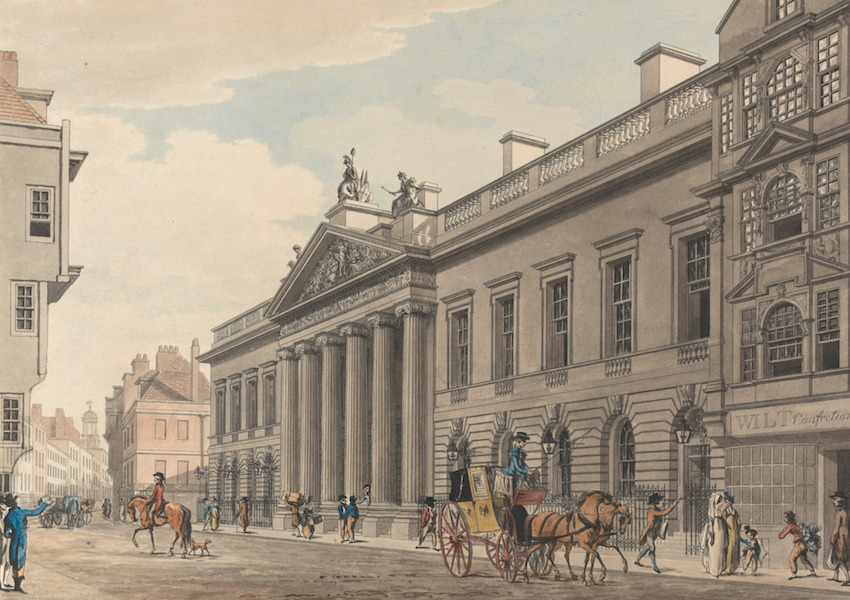 East India House
East India House
He was in his father’s shadow for much of his life everyday, socially, intellectually, and morally. It is painfully apparent to an auditor of the ‘Autobiography’ that Mill had no friends. He had peers; he had colleagues; he had associates; he had debaters and opponents. But he had no friends, which he as much as says more than once, though he uses the term ‘friend,’ it usually means someone he knew, and nothing more intimate. He had no interests but the unforgiving logical analysis of important matters learned from and constantly reinforced by his father. This is not the person to sit next to at dinner. He could debate the great issues of the day but he could not make small talk, or show any interest in pictures of a seat-mate’s children. A cold fish, I would guess. Ready to beat you to death in argument and inept in passing the butter, because he never played any boyhood games meant he had zero physical dexterity, something he himself notes twice in the ‘Autobiography.’
Chapter Five (5) is superb. In it Mill reflects on his many and varied experiences, and knocks off some bon mots as only he could. He paraphrases Thomas Hobbes’s remark that ‘When reason is against a man, he retaliates by being against reason’ which made me think of all those deniers (climate change, Catholic Church pedophilia, Holocaust, Greek debt, etc.). I listened to this while walking the dog, pushing pedals at the gym, or taking the train, so I could not take notes or mark-up the text.
HIs conclusion in this chapter is that political theory is best confined to a few principles which would allow inferences to be drawn in particular circumstances, rather than trying to lay down a single ideal institutions. Mill lost faith in a singularly unified theory and recognised the inescapable influence of context. Under the influence of Alexis de Tocqueville, Mill wanted the deductions to be based on facts, hence I referred above to inferences and not deductions.
Likewise, Mill concluded that perfect political institutions were of no value in themselves. The underlying social order was decisive. The most perfect political institutions would be hollow shells unless the society valued and embraced them for their purposes. To make a comparison, the church may be full, but do they really believe and act like Christians everyday in every way?
Mill once fancied himself ‘a reformer of the world,’ but during his depression, he asked himself this question: If all the material and moral ideals he espoused were realised in the world, would he then be happy? No, he answered. He concluded that happiness if not an end in itself, but rather a by-product of purposeful activity. Both trip and arrival are important.
In Chapter Six (6) Mill refers to Mr. Warren and the villages he set up. It was a passing reference but I want to see it in the printed text when the copy I ordered arrives. I found a reference to Warren and his villages in a history of anarchism. Mill’s praise for Warren villages is odd, since Mill knew nothing about them, not even if they existed. So much for Tocqueville’s influence.
Later in Chapter Seven (7) he refers to the Hare-Clarke voting system as the salvation of representative government over several pages. I have passed these passages on to Anthony Green. Likewise there is also in this chapter a reference to multiple votes for the educated, rather than the propertied, and I must get that and send it to Glyn Davis who once asked me about my comment, somewhere, on Mill and multiple votes. In the ‘Autobiography’ Mill says he proposed multiple votes in a submission; I have since tracked it down and will pass it on in due course.
There are some odd things about the ‘Autobiography’ to be sure. Mill never mentions his mother though there are many, many references to his father who died when Mill was thirty (30). It would seem his father had those nine (9) children all by himself. James Mill was a formidable fellow but he was no hermaphrodite. While there are only a few early references to Mill’s work for the East India Company. Yet Mill specialists have some strange stories about his habits at work.
This review affords an opportunity to correct some errors I made in the review of Capaldi’s biography. It was not Bentham that introduced Mill to poetry. Several peers led him to poetry. I also said he was called a Mechanical Man, not quite, but rather a Manufactured Man by some who found the analytical engine of his mind artificial and inhuman.
I found this Audible reading to be unsympathetic. It sounded almost mechanical, phrases of equal length and inflection followed one another without regard to the content. Perhaps that is partly a fault of Mill’s writing style, which is replete with dependent, relative, and embedded clauses with asides and comparisons which makes it precise but it does not flow.
Not quite easy I said, because Audible kept dropping out, asking me to log in again, resetting the book mark, and so on. None of that is easy when using the iPhone while dog walking. No doubt I brought this on myself, somehow. But it was annoying, and a lesser man might have quit.
‘Noah Webster: The Life and Times of an American Patriot’ (1998) by Harlow Unger
Noah Webster (1758-1843) has shadowed me through life. In reading rooms, office desks, library shelves, legal offices, conference halls, spell-checkers, and seminar rooms, wherever I have gone there I found a direct line back to him on the spine of dictionaries. This Webster is that Webster, the dictionary man.

How and why he became that is a story I could no longer deny myself. He grew up in western Connecticut when it was the frontier. He was the bookish middle son. The family decided to see to his education, while the other children stayed and worked the farm. Off he went to a common (public) school where the emphasis was on discipline (secured by rod and whip). Not even the brutality he found there could quench the intellect within and at sixteen he entered the local church school, Yale.
At the time church and state were united in a Tea Party dreamworld. Taxes were paid at the local church which doubled as town hall and government offices. Yale was little more than a Calvinist secondary school for parsons, and it was funded by those taxes paid at churches. There was no religious toleration. Those who were not Congregationalists were, however, free to move west.
The taxes Great Britain imposed on the thirteen American colonies to pay for the expense of defending them in the French and Indian War of 1754-1763 were punitive, and precipitated the Revolutionary War 1775-1783 (in which the colonist reputiated their sovereign debt to England). Webster’s father had been a militiaman in the French war and during the Revolutionary War, Noah Webster joined a student brigade which marched around but found no English redcoats. However, the Revolution fired him with patriotism for the new world in the making.
He took up teaching children to read upon leaving Yale, and apprenticed to a lawyer for a career in law. That changed when in late 1783 his travel to a cousin’s wedding took him through an encampment of the recently victorious Continental Army of the United States. He, youthful idealist, was thrilled to see and meet the men who had created this New Jerusalem.
What he found was Babel. The men were at odds with each other over scarce provisions, ragged clothing, three-years of back-pay eroded discipline, and — what was worse — was the cacophony of languages. He heard Swedish from the men of Delaware, German from Pennsylvania, Dutch from New York, Welsh from Maryland, Irish from Massachusetts men, Scots from others, French from the forest men of Maine, Spanish from a few from the Caribbean, Italian was also to be found. All of these were further divided into dialects. If anything, English was just one of the plurality of languages.
The language barriers within Americans made prospects for productive cooperation unlikely, and it soon became his lifelong ambition to unite the States with an American language. He formed this ambition at twenty years of age, and stuck to it. The result is on the shelf, Merriam-Webster’s Dictionary. (‘Merriam’ because when he died the brothers Merriam, long-time friends, neighbours, and admirers of Noah, bought the copyright from Noah’s widow, as a way of insuring her financial security. Part of that agreement was keep the name ‘Webster’ on it.)
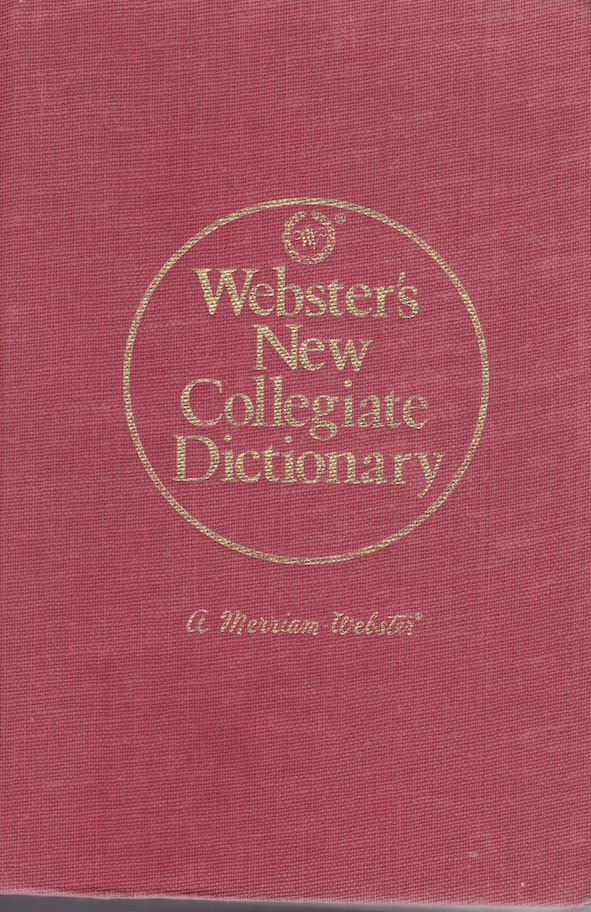 My copy.
My copy.
The division, conflict, unproductive confrontations that he saw in the army camp were mirrored and enlarged among the victorious colonies which were held together by the so-called Articles of Confederation (1776-1789) which had only a congress meeting briefly twice a year. Each state was a law and nation unto itself. Pennsylvania and seven other states had a state army. At the borders of each state tariffs were levied. Since the British had not surveyed more than one hundred miles inland in most places, there were disputes about western borders that were settled by the gun. Each state issued its own coins and bank notes, ran a postal service of sorts. Some levied visa charges for visitors from other states. A murderer could flee across a state border and most likely escape pursuit or apprehension. I said fourteen states, and not thirteen, because Vermont seceded from New Hampshire.
For Webster to secure copyright for his first book meant that fourteen state legislatures had to enact copyright legislation and he then had to secure fourteen separate warrants, each with slightly different conditions. In this state of confusion, there were those who thought returning to British suzerainty would be preferable. Some of these were diehard Tories and others just wanted order and stability.
All of this division stimulated Webster to redouble his efforts. H travelled to nearly every state capitol, selling his book as he went, and lobbied first for a copyright law and then to secure copyright for his book(s). Doing so was hard, expensive, and took him away from home for months at a time. It also made him a national figure, with personal friends in every state.
He was innovator in every respect, As a teacher he thought school was to teach children to read and write, not simply to beat them into submission. He pitched his lessons at the level and world of his five and six year olds, striving to make learning fun, interesting, relevant, and easy. He was very successful at it. He set up his own school and parents who wanted their children, both girls and boys, to learn subscribed to it. He prepared his own teaching material and these became the three books: The Speller, The Grammar, and The Reader. Each was American in each and every way.
To make spelling easy and fun he simplified it, by dropping silent letters, like ‘u’ in most occurrence of ‘ou’ or the unpronounced double ‘l’ in traveller or the double ‘g’ in waggoner, and matching sound to letter by using the ‘z’ extensively. He dropped many, many other silent letters, so that ‘give’ became ‘giv’ and the same for all words with an unsounded terminal ‘e.’ He also tried to change existing spelling to match sound so that some instances of the letter ‘c’ became ‘s’ or ‘sh’ which certainly have made English easier to learn. English, in part because of its polyglot origins, has many silent letters and varieties of letter sound values. And he thought American English had to be learned, and it would be better for being distinct from British English and for being rational in the spirit of the Enlightenment. He was an admiring reader of Jean-Jacques Rousseau, John Locke, Adam Smith, and their ilk.
He likewise inventive in grammar, dropping the Latin cases which had theretofore been used to teach English grammar. Reader, when was the last time the ablative was necessary?
The reader, aimed at young children, was entirely home grown. Gone were incomprehensible British essays about the Astronomer Royal, or legal disquisitions on the Welsh marches, and in came essays about the New England forests, thanksgiving with the native indians, and paeans of praise for the stalwarts of the Revolution. He made an exception for the poetry of William Wordsworth.
No publisher would touch his work. It was too novel, untried, and untested. He borrowed from his family and paid for the first edition of The Speller himself. Five hundred were printed, and by the end of the year 5,000 had been sold. He set the price low to make it accessible and he invested the income in The Grammar, and so it went. Throughout his life he made enough money to live and support his family, but nothing more.
He was a publisher’s dream author. He travelled the country for weeks and months at a time, selling the books in person to every churchmen, legislator, lawyer, judge, and school teacher he could find. During this period he also found time to argue for a stronger national government and that won him friends among the emerging Federalists (and enemies among others). Indeed in the Constitution of 1789 some of his ideas were embodied, and others he proposed were deleted. Chief among those embodied was a strong central executive, the President, and among those rejected were universal manhood suffrage, female equality, and emancipation the slaves.
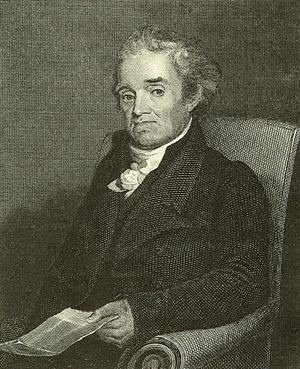 Noah Webster.
Noah Webster.
Much of the middle of the book is a summary of American history in the turbulent period from 1789 to 1830. Reading it reminded me of how well educated I had been, there along the Platte, because I knew most of it in broad: Citizen Genet, the undeclared naval war with France, the Jay Treaty, Thomas Jefferson’s ascendence, and so on. Webster was constantly in the fray, opinionated, pompous, self-righteous, and often right. He saw unity as the only path to survival, and advocated a strong central government.
He moved to New York City to found first a magazine and then a newspaper, both of which failed at personal and professional expense. He then revised his school books and went on the road to sell them. Finally at about 40 he sold the rights to his books, rather than face another round of travel, and started on the dictionary that made him immortal. He also worked with his cousin Daniel Webster (he of the devil in the Ambrose Bierce story) to enact the first copyright legislation in the United States.
He worked on the dictionary singlehanded for 20+ years and compiled 70,000 entries, far in excess of its only rival, Dr Johnson’s (which I am proud to say adorns our shelves). To study the etymology of words Webster learned German, to go with the French and Latin he had. In time he traced words through dozens of languages. He travelled to London and Paris when he was 60 to research in libraries there. It was a Herculean labour. The result was pure Noah Webster. Definitions, examples, the etymology was slanted to reflect his Calvinism, American patriotism, and Anglo-Saxon heritage.
It was difficult to find a way to publish this whopper. He did finally manage to do so with financial support from John Jay (of the Federalist Papers), and it was an immediate commercial and critical success. He had long since modified his efforts to reform spelling on rational grounds and moderate his zeal for being a know-it-all. The two volume work that resulted was hailed far and wide.

Since the veneration for Dr. Johnson and his dictionary had prevented any new dictionary in England for two generations, Webster’s was taken up there with enthusiasm. For a time more copies of Webster’s Dictionary were sold in England than in the United States, despite the explicit American character of Webster’s from the title page on. In a 1917 court ruling the name Webster on a dictionary passed into the public domain and anyone may now use it. Only Merriam Webster dictionaries trace directly back to Noah.
Nearly all the men who led the Civil War had learned to read and write from Webster, the tireless advocate of unity. Jefferson Davis had once in the Senate explicitly praised Webster and his speller. Only those who were self-educated, like Abraham Lincoln, had escaped Webster’s influence. Even a century and a half later, I grew up in the world of words he created. In high school Webster’s Dictionary was on the shelf. In college, purchasing a copy of Webster’s Collegiate was required. In graduate school Webster’s Enlarged was necessary to write that dissertation. When I started teaching I acquired the current edition. Regrettably I cannot trace the genealogy of the spellchecker to be sure but I hope it goes back to the brothers Merriam and from them to Noah.
Remarkable, energetic, and a polymath, Webster was many things. He was also arrogant, a know-it-all, a man who loved the sound of his own voice, a micro-manager, someone who did not understand the word ‘no’ when applied to him. He must have been a very high-maintenance individual. He also ha[ed the Constitution, fathered the copyright laws, founded Amherst College, taught a nation to spell, and brought forth that dictionary (and its many imitators that use his name) that remains a gold standard today.
 Harlow Unger
Harlow Unger
Harlow Unger is the author of twenty-three books, most on individuals and themes from this same period in American history. There is a considerable body of research behind the book. That said, I found it hard to read – the prose oscillates from inscrutable to leaden to transparent, with too much of the first and not enough of the last. The emphasis is on Webster the patriot, as in the subtitle, and not on his personality or his dictionary. There is little of the inner man to be found in these pages. Nor is there much about how he went about the process that created that lasting testament, the dictionary. Those years occupy a small part of the book. Of course, no book can do everything, and I learned a lot from it. My thanks to the author.
‘Groucho Marx, Master Detective’ (1998) by Robert Goulart.
After seeing ‘Duck Soup’ (1933) I had Groucho on the brain. Then I remembered this book which I had started to read years ago, but it had gotten bumped by…a deadline, another book, a failure of concentration, the winds of time, or something. My flawless shelving system allowed me to retrieve in a the twirl of a moustache end.
It is simple and diverting, though Groucho wears, erodes, irks, and bores. Julius Henry Marx just does not have an off-switch. Even when sleuthing, he is wisecracking and pratfalling much to the irritation of his straight-man Watson, Frank Denby, a gagwriter for radio when not sleuthing.
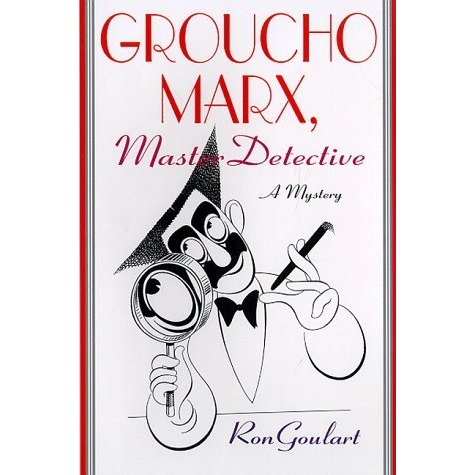
In 1937 a girl’s suicide in Hollywood irks Julius who is quite sure that she was not the suicide-type, and Denby finds the police stonewall suspicious. Off they go…. A midnight visit to a funeral home /office /parlour is straight out of a Marx Brothers picture with an unexpected touch that I will not spoil here.
They come up with nothing but then, true to the scriptwriter’s formula, someone takes a shot at them, convincing them that there is a conspiracy afoot. The plot twist toward the end was visible for miles.
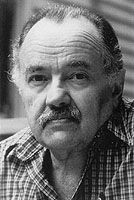
There are a number of other titles in this series from the industrious Mr. Goulart.
But if the trash-talk of Groucho was cut from this book, the remainder would be a short story of 60 pages or so. Too bad because the writer can write. The romance between Jane and Frank is charming, and some of the minor characters like the aged bellboy are well drawn, and the plot brings in the usual suspects, crooked cops from Bay City (where else), gamblers, starlets who will do anything with anybody for shot at fame and fortune, and even a bloodhound.
Wikipedia is full of information about the Marxes. The short version is five brothers, one of whom never acted, Gummo, another, Zeppo, who only did a little before moving on, and the three core brothers of stage, radio, and screen: Groucho, Harpo, and Chico. Stage names, yes, all ending in ‘o’ as was some fashion in their early years. Even Gummo who never took to the stage had an ‘o’ nickname to be consistent.
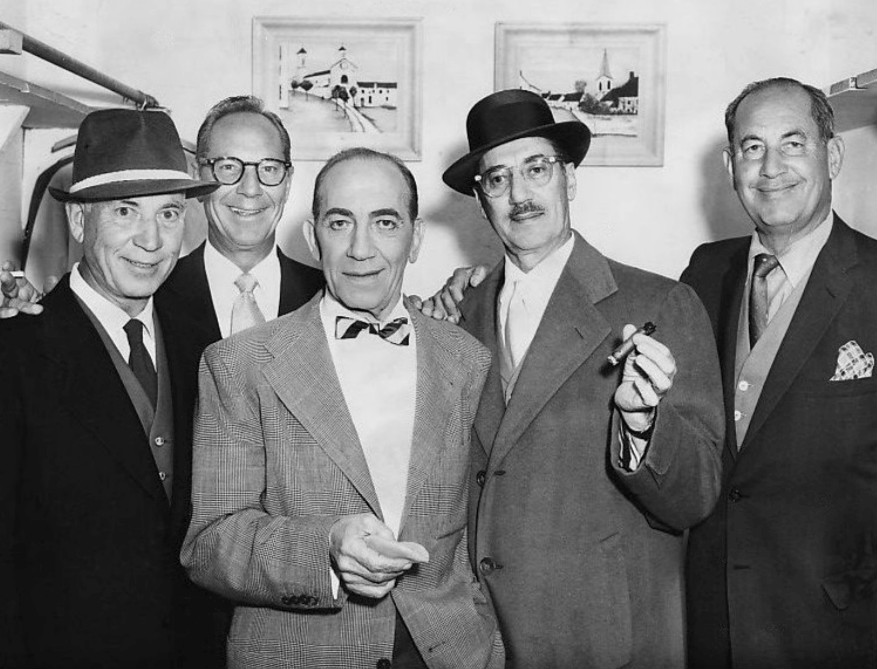 From left to right: [do it yourself]
From left to right: [do it yourself]
Chico because he chased women (chicks), Harpo because…. [figure it out]. Zeppo after the airship. Gummo because he crept around like a gumshoe. And Grocho because…. He preserved his mystique by giving numerous explanations over the years. Their parents immigrated to New York from Alsace, ethnic German Jews. No relation to Karl, the one without any sense of humour.
‘Between You & Me: Confessions of a Comma Queen’ (2015) by Mary Norris.
This book from a major New York City publisher has had a big push. It pops up on web sites, newspaper review pages, NPR programs, and more.
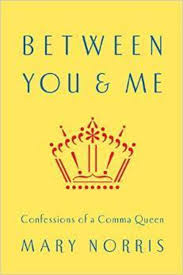
I took the bait, remembering how much fun reading ‘Eats, Shoots and Leaves’ (2003) by Lynn Truss was. Inspired by reading that I tried Jacques Barzun’s ‘Simple and Direct: A Rhetoric for Writers’ (2001), and it, too, was entertaining and enlightening, but much heavier going, and at about page 50 I cut Jack loose. It was too much! It was like getting an assignment back from Miss Moses in junior high school drenched in the Red Sea of ink flooding over each page. (The name has been changed to protect the guilty.) She did not know when to quit and neither did Jack.
In ‘Between you & me’ the usual suspects appeared in the lineup. Among them were the evil twins Who and Whom, the hyphen, and the serial comma.
Who is on first? That is the nominative case. To whom did I give the keys? That is the accusative case (aka dative case). Got it? The doer is nominative and the done to is accusative. With me? It gets more complicated with noun groups and compounds, but I left the train before that. Their cousin, possessive case, Whose is best left for the advanced course.
The hyphen is just too hard for me. Compound nouns seldom take it but the words rendered as a compound adjective must. The boarding house fell down. But the boarding-house fire was bad. See? Sort of, but not for long. It turns out Herman Melville’s whale was Moby Dick but his book about Moby Dick was Moby-Dick. Sit down and think about that. Then there is breaking words over lines with hyphens. Is it at the first syllable. the first pair of consonants, or at the first meaningful break? Eng-land or En-gland or Eng-land. Two out of three? Grammar does not accept such populist methods of decision-making (or is that ‘decision making’).
My favourite is the serial comma which I learned way back in Hastings on the Platte to call the Oxford comma; so called because it was prescribed by the Oxford University Press, which was regarded along the Platte as the highest court for punctuation, though patriotism required Noah Webster’s spelling. The Oxford comma is that one before ‘and’ at the end of series, as in ‘eats, shoots, and leaves.’ This by the way illustrates one of the features of John Stuart Mill’s rule-utilitarianism. That last comma is not always necessary but it is best to include it because it is too time-consuming to decide if it is needed in this or that instance and that decision may be mistaken. Just follow the rule, and include it.
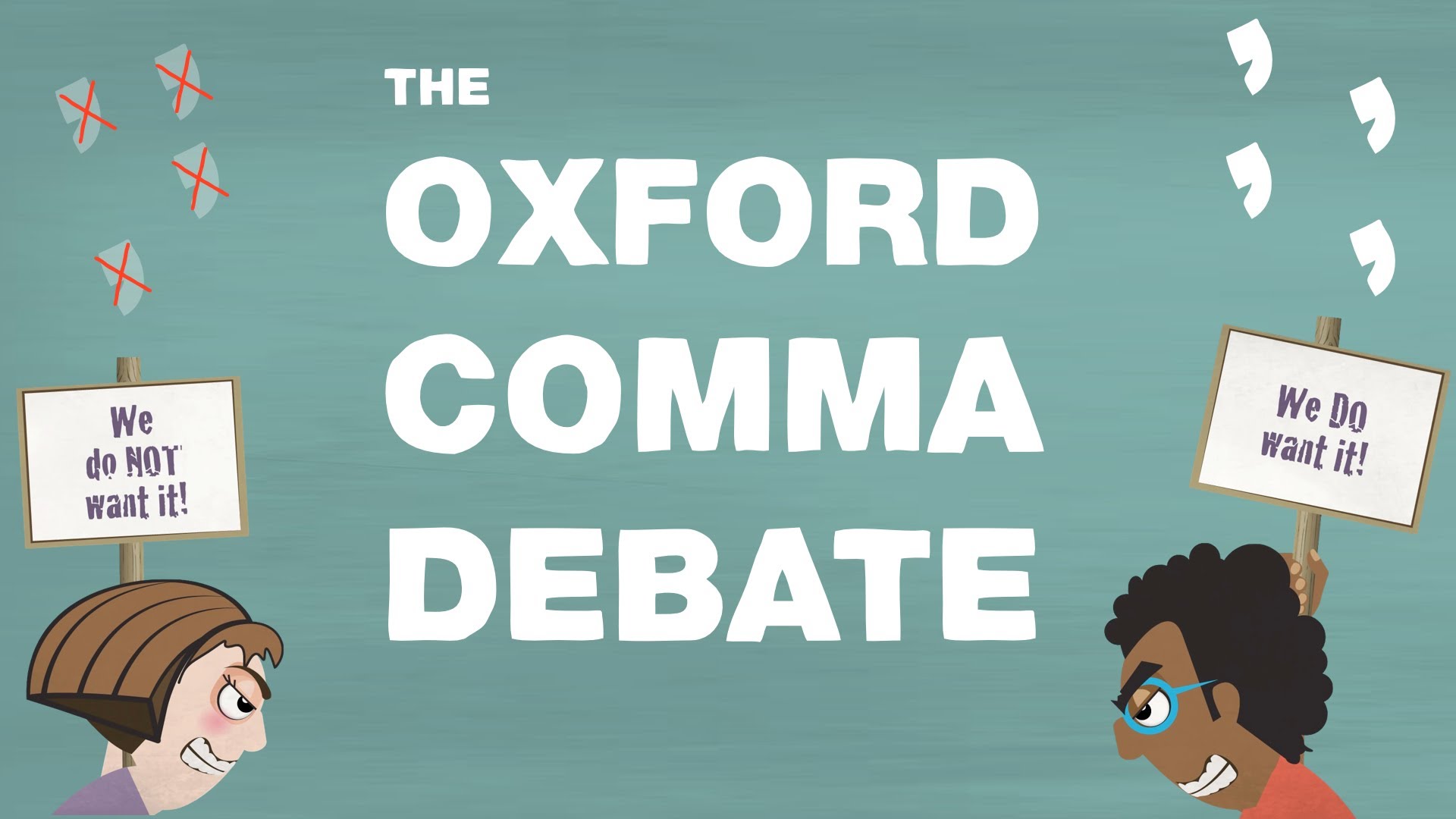
I have enlivened many dinner parties by bringing up the Oxford comma, discovering that some people invest much of themselves in that little squiggle, the ‘,’ and their cool, detached, and cynical demeanour slips entirely when it is bruited. People who yawn at important topics like man’s inhumanity to man, spitting by baseball players, or coal-seam gas, roll-up their sleeves for Indian wrestling when the serial comma is mentioned. (I feel free to say ‘man’s’ inhumanity to ‘man’ in the masculine since men are the principle culprits.) Defending the serial comma, I have alienated some guests who went away muttering never to return!
Back to Norris, there was a very informative and amusing aside on Noah Webster’s several efforts to create an American language, stimulated in equal measure by his patriotism and rationality. No less a figure than George Washington encouraged him in that endeavour. He had successes and he had failures. The ‘ou’ passed out of most American use and he made the ‘z’ do a lot more work than it did across the Atlantic, and, animated by the egalitarian spirit, he called it by its right name ‘zee’ and not that snobbish ‘zed.’ If it looks like a zee, acts like a zee, sounds like a zee, then call is ‘zee.’
Webster’s failures may outnumber his successes. His multiple efforts to match sound values to sight did not always carry the day, e.g., ‘cloke’ for ‘cloak’ and many of the same ilk died in the pages of his lexicography. I have resolved to read a biography of this Webster (and maybe one day Daniel Webster, too).
It was also an eye-opener to learn that any dictionary can take the name of Webster, and several have. But an heir to Noah always bears the name Merriam because the brothers Merriam bought the rights from the widow Webster when Noah died, and that company has continued to publish it. A dictionary titled ‘Internationl Websters’ or ‘Websters New’ is unlikely to have anything to do with the founder, Noah. I turned to my reference shelf and was glad to see that mine is a Merriam. I am now armed against such infiltrators in the future.
There was also a poignant moment when Norris quoted from a hand-written letter Jacqueline Kennedy sent to Richard Nixon in reply to his note of condolence when Jack was murdered to show how emotion is conveyed by punctuation. More importantly, to this observer it confirmed once again that Jackie was a higher being.
Emily Dickinson haunts the pages. Her poems, written privately like a diary, have presented editors and analysts a lifetime of challenges since she relied almost exclusively on the dash (—) for terminal punctuation, sometimes straight and level, sometime upward ascending, and sometimes downward descending, and some times wiggly. That combines with her very poor penmanship has created the space for many learned seminars to interpret her intentions and how best to convey them. When I read her poems (Saturday mornings at 8:00) I was unaware of that (and much else). Signing up for a class that met on Saturday at 8:00 am seemed like a good idea when I registered one semester as an undergraduate, so I did. By 9:00 am I would have knocked off another credit and have the day ahead. That was the plan. The reality was that it never seemed like a good idea on Saturday morning at 7:00 am.
I was impressed by the many editorial stages through which a ‘New Yorker” manuscript, once accepted, passes en route to the glossy page. The effort is great; the division of labor is elaborate; and the care is microscopic. Yet the product is largely ephemeral compared to the hubris that creates it.The elephant brings forth the mouse, a phrase I learned in Thailand when visiting Chulalongkorn University, meaning a great effort for a small result.
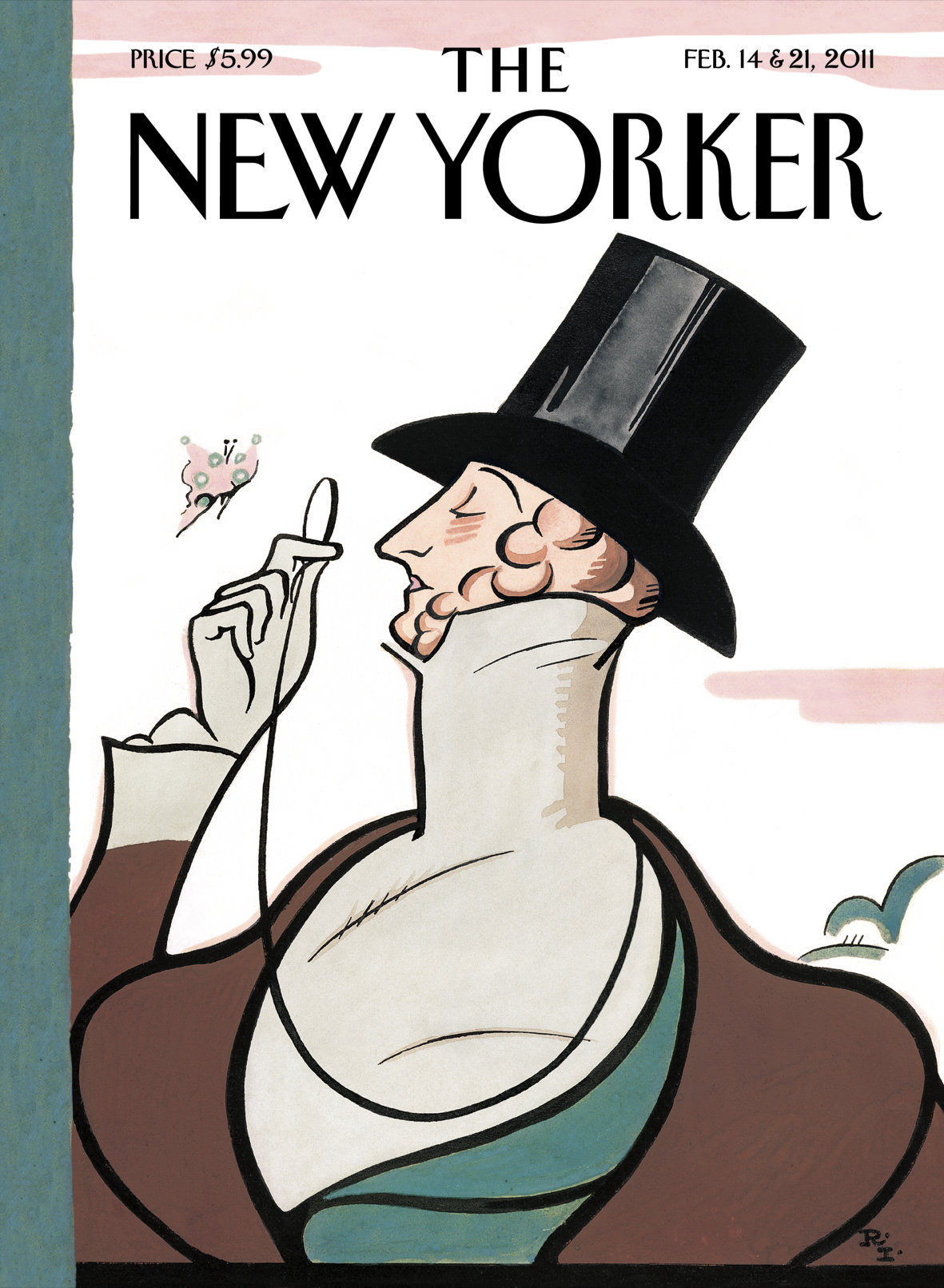
The difference between copyediting non-fiction and fiction was most interesting. It presents many challenges that have never crossed my mind when reading William Faulkner or John Updike. The details are many but perhaps the best illustration is that difference between the spoken and written language. That difference is a tension in fiction, whereas in non-fiction it is a rule. The imperative in fiction is let the author’s voice sound. Updike must sound like the prissy perfectionist and Ivy-League graduate he is and Faulkner must sound like the uneducated backwoodsman he is. But, yes there is a ‘but’ coming and it is a sizeable one, another thing I never considered.
If it appears in the ‘New Yorker’ does that henceforth make it right? If the magazine publishes one of Faulkner’s malapropisms, e.g., ‘most all’ for ‘almost all,’ will that cause its lemming-like readers all use that neo-logism? That the responsibility the ‘New Yorker’ bears in its self-assigned role as arbiter of United States English. [Sound of fife and drum.] Believe it or not, Ripley, decisions over punctuation at the ‘New Yorker’ are made against that national standard, and authors like Richard Ford have been subjected to editorial correspondence of some volume arguing over commas, what else?
By the way, getting that hyphen in ‘neologism’ above was a head-on struggle with automatic correct. Norris comments more than once on the habit of autocorrect to change things it ought not to change and the struggles at the ‘New Yorker’ to devise an in-house system to let it be itself. Regrettably nowhere does she discuss how it is that autocorrect got like that. Is it nature or nurture? Would remediation help?
I found no discussion of the relationship of quotation marks to punctuation, an old pet peeve of mine. I solved years ago, inspired by Mr Lloyd in high school, by opting for what I now know to be a Millian (as in John Stuart) solution by putting the punctuation inside the quotation marks to keep it tidy. I see this is common in North American publications and seldom seen in British publications. The lucky ones will not know what I am talking about.
Like all pedants I have bones to pick. Norris uses direct address, ‘you,’ frequently. Ugh. She also goes to considerable lengths more than once to use the F-word. Most of all there is that title. No, the ‘me’ is right in the accusative, but what about that ampersand? She spares not a word for ‘&’ which I revile in anything but grocery lists. The dentist says I grind my teeth, well I know why! Really, I expected better of the ‘New Yorker!’
I have treated all this with amusement but inside, I am very glad that someone takes the language seriously enough to work that hard at it. Why? Because most people do not, and the people I have in mind are authors and editors, not just teenagers who cannot be bothered.
There was a time when even Disney films cared about the language. Who can forget that touching scene in ‘The Lady and the Tramp’ (1955) when the latter explains to the former that a ‘dog lover’ without a hyphen is a dog. I remember this vividly because Miss Moses was overjoyed after it opened at the Rivoli on Second Street. She positively glowed, unlike the glower that was the norm on Monday mornings, Tuesday mornings, Wednesday… [etc.] and that was so unusual there was much comment among we grammarians, mostly by stolen glances and wrinkled frontal lobes, and some pinching to see if this was reality or a dream.
 Mary Norris
Mary Norris
Like most books rooted in the ‘New Yorker,’ it is snappy, breezy, and a 60-page article puffed up into hardcovers. While the meandering introduction is easy to read, I did not see the point of the recollection of dairy work, nor was it clear to me from the start what the purpose of the book was, though Norris is an amusing and informative companion for trip, the destination was never named.
In the absence of a higher purpose I read it as a memoir of her life and times as a copyeditor for the slickest of the slick magazines. The lustre of the ‘New Yorker’ will never dim in my eyes because it published Hannah Arendt when no other magazine would. Credit William Shawn with that.
Hitler or Churchill, who was the democrat?
Who was the democrat Winston Churchill (1874-1965) or Adolf Hitler (1889-1945)? (For those readers who do not recognise these names, stop here and turn on 7MATE, the two of you deserve each other.)
Wait! Before answering think! What does ‘democracy’ mean?
Most of the time, most people think ‘democracy’ means voting, voting, voting, and counting the votes. Journalists intone the solemnity of leaders submitting themselves to vox populi. Well, the voice of the people, since most would not dare use Latin, even if they knew it.
If voting is the criterion, how do Churchill and Hitler compare?
Short answer: Hitler led his party in far more elections than Churchill did.
Hitler was a candidate for chancellor in five national elections between 1928 and 1933. In those parliamentary elections the vote for his Nazi Party grew from 3% to 44%. He heard the voice of the people. In addition, he led his party in elections in several German states in that period. Moreover, he held a plebiscite in Austria to confirm the Anschluss (the unification of German and Austria).
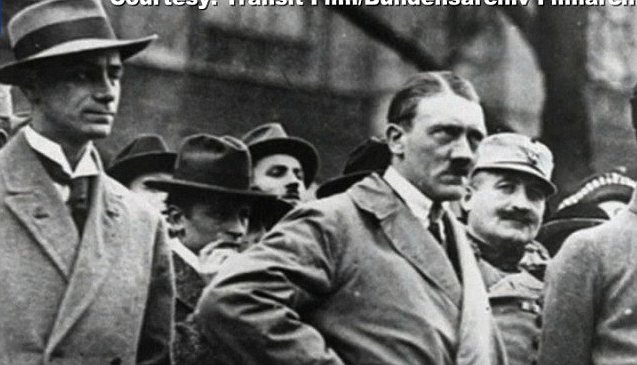 Hitler campaigning in 1932.
Hitler campaigning in 1932.
Churchill, the great war leader and champion of democracy, became Prime Minister in May 1940. There was no vote. The Conservative Party changed leaders. There was no election in Great Britain during World War II (though there were in Australia, Canada, and the United States). The last general election in the United Kingdom had been in 1935. Churchill’s government decided not to call the elections due in 1940. Imagine the fuss a shock-jock would make of an incumbent government not facing the scheduled election. Horror! Outrage! Cliché!
Only in 1945, after the European War was over did Churchill call an election, and he lost, and lost decisively. (He remained leader and led his party to victory in 1949, that being the only election he won as leader.)
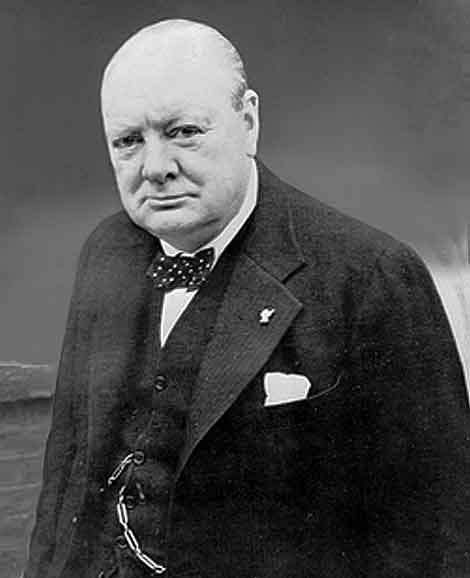 The 65-year old Churchill on his first day as Prime Minister in 1940.
The 65-year old Churchill on his first day as Prime Minister in 1940.
Yet, I would say Churchill’s claim to the title of democrat is greater than Hitler’s. Why?
First, Hitler campaigned in election-after-election AGAINST democracy. He proclaimed the idiocy of choosing leaders by votes and promised to do away with elections, once he had the authority to do so. He was explicit and overt about this. Elections counted the votes of Jews, bankers, women, trade unionists, Gypsies, homosexuals, cripples, and others equal to Aryan votes. ‘Stop that at once!’ he declared. He used the campaigns to air his views, identify, educate, mobilise, and license supporters. As the strength of his party grew in 1932 he unleashed those supporters to intimidate voters, forge ballots, burn ballot boxes from Jewish quarters, threaten voters at polling booths…
These are the facts.
We might speculate that had Hitler called an election in August 1940, November 1941, March 1942, even in February of 1944, he would have won easily and by a big margin. Here is a guess, he (and the Nazi Party) might have garnered 80% of the vote or more. There was after all no opposition left but we could imagine that one of the conservative agrarian parties that merged with the Nazis in 1930 breaking away as the opposition, against them Hitler’s victory might have been 90+%. The contrast is Churchill who called an election in July 1945 and lost while the Asian War continued.
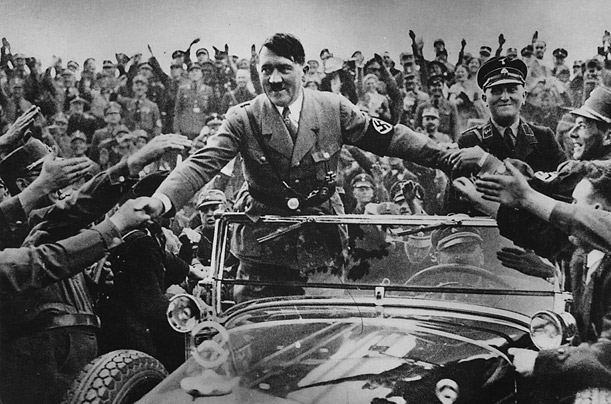 Hitler greets the people after being sworn in as Chancellor.
Hitler greets the people after being sworn in as Chancellor.
Second, Churchill’s claim rests principally on his unstinting respect for and use of parliament during the war years. First he formed a national war cabinet by including the Labour opposition, and second he submitted himself and his government to parliament which remained supreme, though the mandate of its members had lapsed. He explained and justified his actions in parliament, and he replied to questions and criticisms. He permitted the criticisms in the first place. Churchill kept and respected the institutions of British government, including the courts, whereas Hitler fused authorities and abolished institutions, reducing everything to personal loyalty to him in the army oath, and executive orders. It is this respect for and adherence to procedure, process, and practice that adds credit to Churchill’s democratic account. Of course, it is true that there were compromises in the name of the war effort and security, and some of the constraints were probably unnecessary when judged in the cold, clear light of hindsight, but the fundamental institutions remained; there to be re-awakened.
In so doing, Churchill left the democratic culture of Britain undiminished. Men and women grumbled about the government, questioned the need for rationing, complained about health care, suspected profiteering, and wrote letters expressing their vexations to members of parliament, to the BBC, and to newspapers. Newspapers picked away at the foibles and mistakes of government ministries. During the height of the Battle of Britain, during all-clears orators on the ladders in Hyde Park, London, excoriated the British government for its continued hold on India. This was all constrained but compared to Germany after 1933 it was a riot of freedom.
By the way, there was a great deal of opposition to Churchill, within his own party for a start. He was too belligerent many thought, including the first of his foreign ministers. Some Conservatives wanted him to fail and be replaced by a more pliable figure. Theirs was a whispering campaign, true, but it would have been exterminated in Germany, whereas Churchill combated it though parliament.
Conclusion? Voting alone does not democracy make. A small conclusion it might seem but it has major implications.
